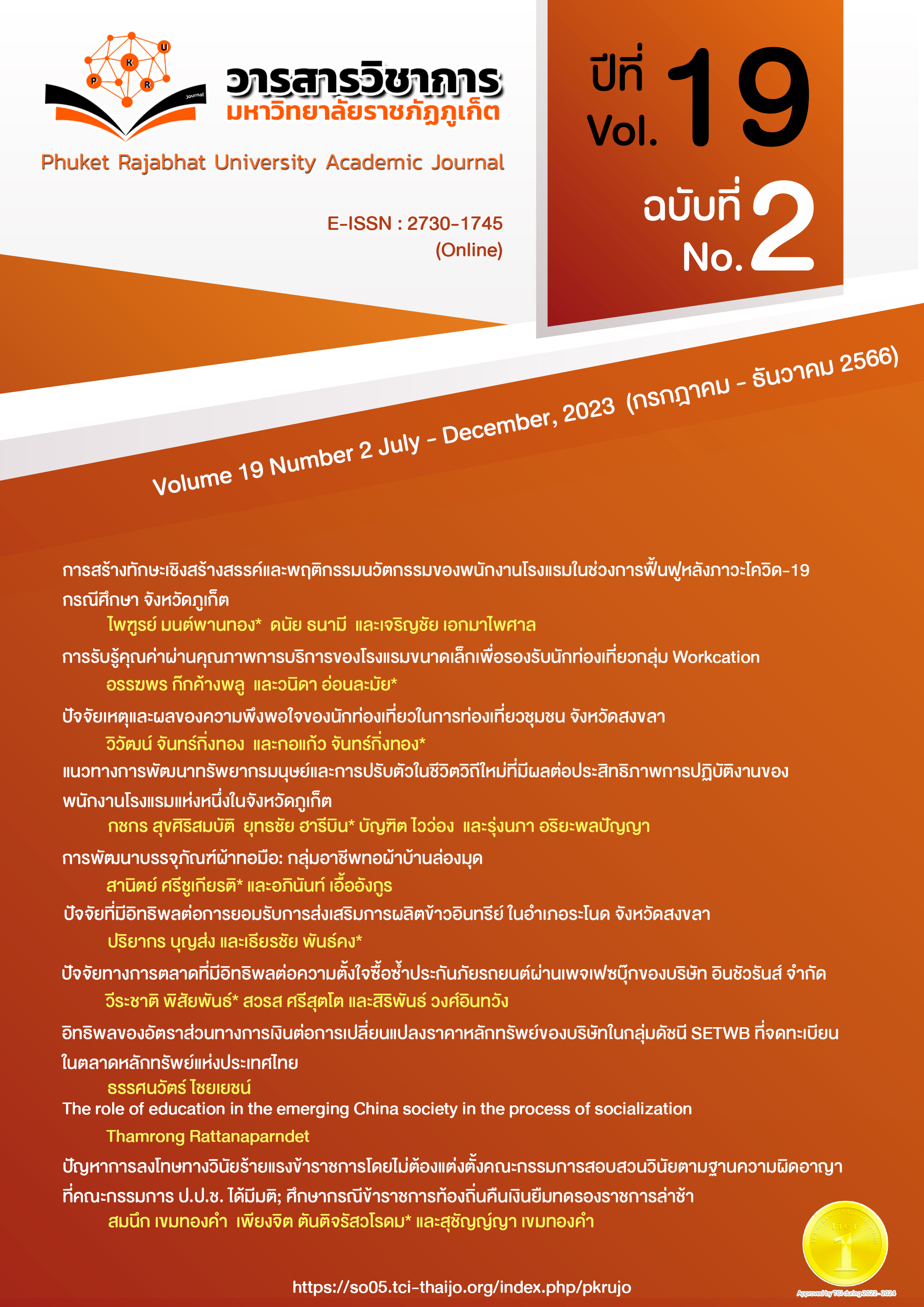แนวทางการพัฒนาทรัพยากรมนุษย์และการปรับตัวในชีวิตวิถีใหม่ที่มีผลต่อประสิทธิภาพการปฏิบัติงานของพนักงานโรงแรมแห่งหนึ่งในจังหวัดภูเก็ต
Main Article Content
บทคัดย่อ
การวิจัยนี้มีวัตถุประสงค์ เพื่อศึกษาองค์ประกอบของการพัฒนาทรัพยากรมนุษย์ต่อการปฏิบัติงานในชีวิตวิถีใหม่ เพื่อวิเคราะห์ความสัมพันธ์การปรับตัวการปฏิบัติงานในชีวิตวิถีใหม่ เพื่อเสนอแนวทางการพัฒนาการปฏิบัติงานในชีวิตวิถีใหม่ รูปแบบการวิจัยเป็นเชิงปริมาณ ใช้แนวคิดการพัฒนาทรัพยากรมนุษย์ การปรับตัวในการปฏิบัติงาน และประสิทธิภาพในการทำงานเป็นกรอบการวิจัย โดยกลุ่มตัวอย่างเป็นพนักงานของโรงแรมแห่งหนึ่งในจังหวัดภูเก็ตจำนวน 180 คน โดยใช้วิธีการสุ่มตัวอย่างแบบแบ่งชั้น และใช้แบบสอบถามรูปแบบออนไลน์เป็นเครื่องมือในการวิจัย และมีการวิเคราะห์ข้อมูลโดยใช้สถิติเชิงพรรณนา T-test, F-test, และการวิเคราะห์การถดถอยเชิงพหูคูณ ผลการวิจัยพบว่า โดยภาพรวมมีค่าเฉลี่ยอยู่ในระดับมาก และเมื่อวิเคราะห์ความสัมพันธ์พบว่า ในภาพรวมมีความสัมพันธ์เชิงบวกในระดับสูงที่สุด และการศึกษาแนวทาง พบว่าควรเพิ่มสิ่งจูงใจต่างๆ เพื่อให้พนักงานมีแรงจูงใจในการพัฒนาตนเองเพื่อการปฏิบัติงานที่มีประสิทธิภาพสูงสุด ข้อค้นพบจากงานวิจัย สามารถนำผลการวิจัยไปใช้เป็นข้อมูลประกอบสำหรับการกำหนด แนวทางการพัฒนาทรัพยากรมนุษย์ในองค์กรให้ตรงกับความต้องการของโลกปัจจุบัน
Article Details

อนุญาตภายใต้เงื่อนไข Creative Commons Attribution-NonCommercial-NoDerivatives 4.0 International License.
เนื้อหาและข้อมูลในบทความที่ลงตีพิมพ์ในวารสารวิชาการมหาวิทยาลัยราชภัฏภูเก็ต ถือเป็นข้อคิดเห็นและความรับผิดชอบของผู้เขียนบทความโดยตรง ซึ่งกองบรรณาธิการวารสารฯ ไม่จำเป็นต้องเห็นด้วยหรือร่วมรับผิดชอบใด ๆ
บทความ ข้อมูล เนื้อหา รูปภาพ ฯลฯ ที่ได้รับการตีพิมพ์ในวารสารวิชาการมหาวิทยาลัยราชภัฏภูเก็ต ถือเป็นลิขสิทธิ์ของวารสารวิชาการมหาวิทยาลัยราชภัฏภูเก็ต หากบุคคลหรือหน่วยงานใดต้องการนำทั้งหมดหรือส่วนหนึ่งส่วนใดไปเผยแพร่ต่อหรือเพื่อกระทำการใด ๆ จะต้องได้รับอนุญาตเป็นลายลักษณ์อักษรจากวารสารวิชาการมหาวิทยาลัยราชภัฏภูเก็ตก่อนเท่านั้น
เอกสารอ้างอิง
Acemoglu, D., & Restrepo, P., (2020). Robots and jobs: Evidence from US labor markets. J. Polit. Econ, 128(6), 2188–2244.
Bhaskar, A. U., & Mishra, B. (2017). Exploring relationship between learning organizations dimensions and organizational performance. International Journal of Emerging Markets, 12(3), 593-609. https://doi.org/10.1108/IJoEM-01-2016-0026.
Chedthida, K. & Narit, K. (2019). The Human Resource Development by Monozukuri Towards Thailand 4.0 of SMEs. The Journal of King Mongkut's University of Technology North Bangkok, 29(4), 686-699.
Christensen, C. M., Michael, R. & Rory M. (2015). What Is Disruptive Innovation?. Harvard Business Review. 93(12). 44–53. D-12-2020-0171
Clayton, S., Devine-Wright, P., Stern, P., Whitmarsh, L., Carrico, A., Steg, L., Swim, J., & Bonnes, M. (2015). Psychological research and global climate change. Nature Climate Change, 5, 640-646.
Harrington, E. (1913). Twelve Principles of Efficiency. The Engineering Magazine.
Makela¨ a, ¨ L., Saarenpa¨¨a, K., & McNulty, Y. (2017). Flexpatriates, short-term assignees and international commuters. In Y. McNulty, & J. Selmer (Eds.), Research handbook of expatriates (pp. 276–295). Edward Elgar Publishing.
McClelland, D., C. (1961). The Achieving Society. D. Van Nostrand Company Ine.
Narumon, S. (2007). Organizational Risk Management. Bangkok: Than Books.
Örtenblad, A. (2018). What does “learning organization” mean?. The Learning Organization, 25(3), 150-158. https://doi.org/10.1108/TLO02-2018-0016.
Peterson, E., & Plowman, E.G. (1989). Business organization and management. Richand D. Ewin, Hom wood Illinois.
Pornrat, S. (2020). Work from Home Adaptation of Employees in the Eastern Economic Corridor During the Covid-19 Crisis. Burapha Journal of Business Management, 9(2), 14-33
Reiche, B. S., Lee, Y., & Allen, D. G. (2019). Actors, structure, and processes: A review and conceptualization of global work integrating IB and HRM research. Journal of Management, 45(2), 359–383.
Richard A. S. & Elwood F., H. (2001). Foundations of Human Resource Development. Berrett-Koehler.
Roy,S. C. (1999). Introduction to Nursing : An Adaptation Model. Prentice Hall.
Rudsada, K. (2010). Guideline for Increasing Service Efficiency of Hotels under Patong Hotel Association, Phuket Province. Journal of Humanities and Social Sciences Suratthani Rajabhat University, 2(1), 253-255.
Saramolee, A., Hareebin, Y., Boonkaew, S., Aujirapongpan, S., & Jutidharabongse, J. (2022). Professional Skills Development Affecting Organizational Learning and Corporate Performance: An Empirical Study in Thailand. TEM Journal, 11(1), 234–241.


